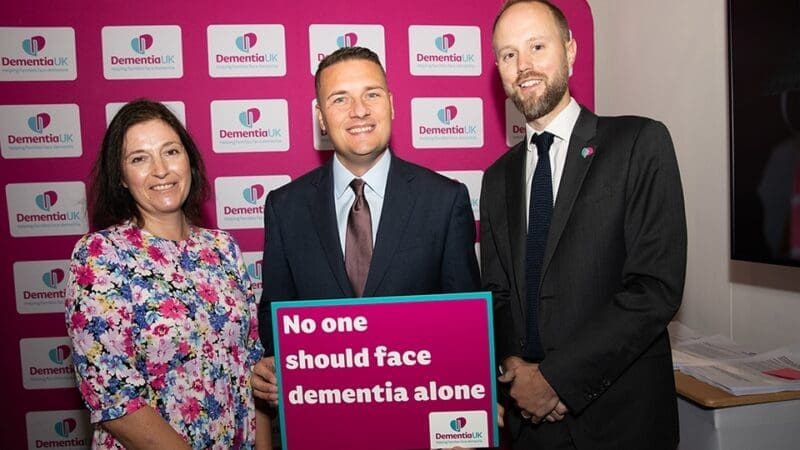
Putting dementia on the agenda at the 2024 party conferences
Our Policy and Public Affairs Manager, Faradane O’Callaghan, reflects on this year’s political party conferences and the progress we have made in the first 100 days of this Government.
We call on Government to increase investment in public health in England to prevent ill health, reduce health inequalities, and support a sustainable health and social care system.
Public health is facing a funding crisis. The NHS Five Year Forward View argues that “the future health of millions of children, the sustainability of the NHS, and the economic prosperity of Britain all now depend on a radical upgrade in prevention and public health”.[i] Despite this, the Government has continued to cut the Public Health Grant year-on-year. Because of this, local authorities’ ability to provide the vital functions that prevent ill health are being severely compromised.
In the 2015 Budget, the Chancellor announced a £200 million in-year cut to the Public Health Grant, followed by a further real-terms cut averaging 3.9% each year (until 2020/21) in the 2015 Spending Review.[ii] Overall, the Public Health Grant is expecting to see a £700 million real-terms reduction between 2014/15 and 2019/20—a fall of almost a quarter (23.5%) per person.[iii] In 2019/20, every local authority has less to spend on public health than the year before. According to analysis by the Health Foundation, almost all local authority public health services faced cuts between 2014/15 and 2019/20: for example, spending on stop smoking services and tobacco control are expected to fall by 45%; sexual health spending is expected to fall by 25% and specialist drug and alcohol services for young people is expected to be cut by over 41%.iii
Local authorities have made efficiencies through better commissioning, but cuts are nevertheless impacting frontline prevention services. As an example, research conducted by Action on Smoking and Health and Cancer Research UK shows that, following year-on-year reductions to the Public Health Grant since 2015, stop smoking services have been persistently cut across local authorities. Now, the majority (56%) of local authorities are no longer able to offer a stop smoking service to all smokers in their area.[iv]
Taking funds away from public health is a false economy. Unless we restore public health, our health and care system will remain locked in a ‘treatment’ approach, which is neither sustainable nor protects the health of the population as it should. In the UK, smoking caused an estimated 115,000 deaths in 2015,[v] whilst alcohol caused around 7,700 deaths in 2017.[vi] In England, there were around 617,000 hospital admissions where obesity was a factor in 2016/17.[vii] These preventable factors increase the risk of certain cancers, type 2 diabetes, lung and heart conditions, musculoskeletal conditions and poor mental health. Obesity alone is estimated to cost the NHS £5.1 billion every year, with wider costs estimated to be around three times this amount.[viii]
The Government must equip local authorities with adequate resources to provide vital public health functions. The Government currently plans to phase out the Public Health Grant by 2020/21, after which they propose to fund public health via a 75% business rates retention scheme. Whatever model is ultimately implemented, it must generate enough funding for local authorities to deliver their public health responsibilities, enable transparency and accountability, and be equitable so that areas with greater health needs receive proportional funding.
In her speech on 18 June 2018, the Prime Minister called for a renewed focus on the prevention of ill-health: “Whether it is cancer, heart disease, diabetes or a range of mental illnesses, we increasingly know what can be done to prevent these conditions before they develop – or how to ameliorate them when they first occur. This is not just better for our own health, a renewed focus on prevention will reduce pressures on the NHS too.”[ix]
This statement is supported by:
Action on Smoking and Health
Action on Smoking and Health Wales
Age UK
Alcohol Change UK (formally Alcohol Research UK)
Alcohol Health Alliance
Association of Breastfeeding Mothers
Association of Directors of Public Health
Association for the Study of Obesity
Beat Charity
Breast Cancer Care & Breast Cancer Now
Breastfeeding Network
British Association of Sexual Health and HIV
British Heart Foundation
British HIV Association
British Liver Trust
British Lung Foundation
British Medical Association
Brook
Cancer Research UK
Centre for Mental Health
Children’s Liver Disease Foundation
CLIC Sargent
Collective Voice
County Councils Network
Dementia UK
Diabetes UK
Faculty of Sexual and Reproductive Healthcare
First Steps Nutrition Trust
FPA
Health Action Campaign
Health Equalities Group
Health Foundation
Healthy Stadia
Helping Overcome Obesity Problems
HENRY
Hope UK
Institute of Alcohol Studies
Institute of Health Visiting
IPPR
IPPR North
Jo’s Cervical Cancer Trust
Kidney Research UK
La Leche League GB
LGBT Foundation
Local Government Association
Local Government Information Unit
Localis
Macmillan Cancer Support
Mayor, Greater Manchester
Mayor of London
Mayor, Sheffield City Region
Mental Health Foundation
Mental Health Research UK
Mentor
Metro Mayor, Liverpool City Region
Mind
NAM aidsmap
National AIDS Trust
New Local Government Network
NHS Clinical Commissioners
NHS Providers
Obesity Health Alliance
Positive East
Release
Royal College of Anaesthetists
Royal College of Emergency Medicine
Royal College of General Practitioners
Royal College of Nursing
Royal College of Physicians
Royal College of Surgeons
Royal Pharmaceutical Society
Royal Society for the Prevention of Accidents
Royal Society for Public Health
SANE
School and Public Health Nurses Association
Substance Misuse Management Good Practice
Sustain
Terence Higgins Trust
UK National Kidney Federation
Versus Arthritis
World Cancer Research Fund
YoungMinds
[i] NHS England. Five Year Forward View.
[ii] Public Health England. Annual budget allocations 2016/17.
[iii] The Health Foundation. Briefing: Taking our health for granted – plugging the public health grant funding gap.
[iv] Action on Smoking and Health & Cancer Research UK. A changing landscape: Stop smoking services and tobacco control in England.
[v] Peto R, Lopez A, Boreham J, et al. Mortality from smoking in developed countries 1950-2010.
[vi] Office of National Statistics. Alcohol-specific deaths in the UK: registered in 2017.
[vii] NHS Digital. Statistics on Obesity, Physical Activity and Diet – England, 2019.
[viii] House of Commons Health Committee. Childhood obesity – brave and bold action. 2015.
[ix] Prime Minister’s Office. PM speech on the NHS.
We’re campaigning for better care so that everyone affected by dementia gets the specialist support they deserve. Join us.

Our Policy and Public Affairs Manager, Faradane O’Callaghan, reflects on this year’s political party conferences and the progress we have made in the first 100 days of this Government.

With more people in the UK dying of dementia than any other condition, our Head of Policy, Campaigns and Public Affairs, Andrew Pike, reflects on why we must all work together to ensure that every family affected receives the support it needs.

Our Head of Campaigns and Public Affairs, Andrew Pike, shares how the new Government's plans could impact people affected by dementia.